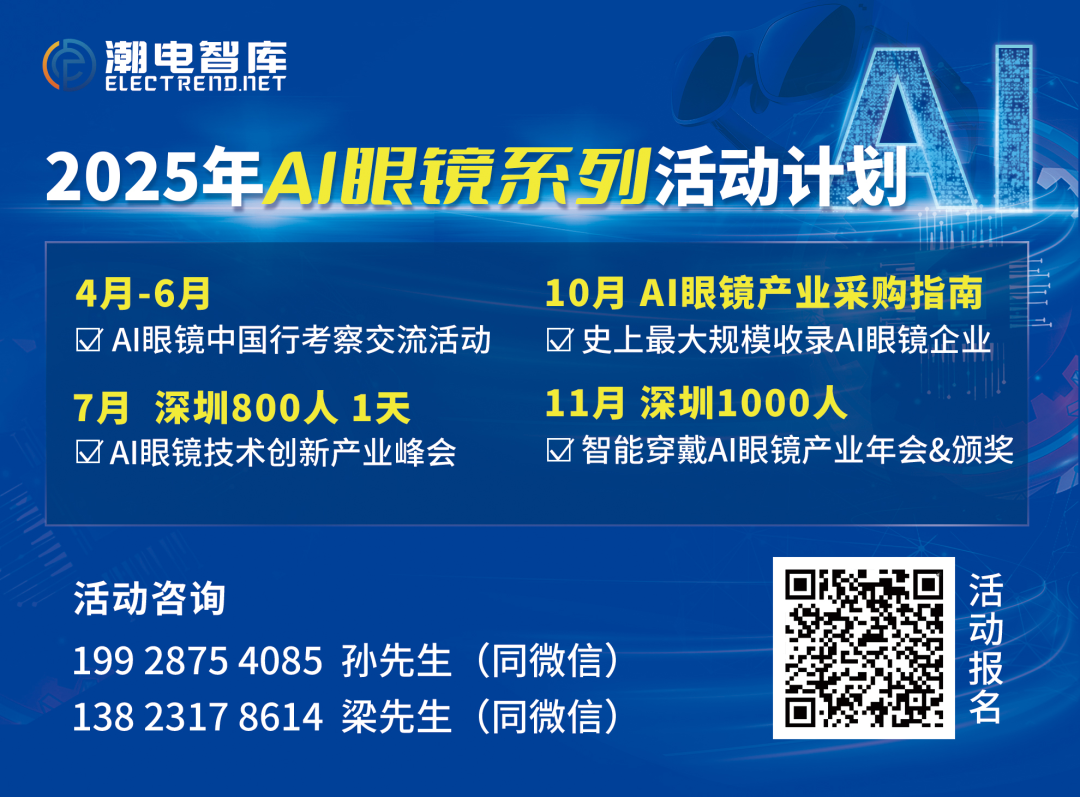Industry weatherman
Currently, the mainstream AI glasses on the market are generally priced between 400 to 2000 RMB, with the main sales price range being 1000 to 1500 RMB. Qualcomm dominates the mid-to-high-end market with its mature AR/VR ecosystem, while domestic manufacturers such as Unisoc and Hengxuan are still seeking breakthroughs in low power consumption and visual processing.
Domestic manufacturer Allwinner Technology today released its latest AI glasses solution, named “Huiyan”. Allwinner also stated that the AI glasses based on the Allwinner V821 “Huiyan” solution have completed their first customer launch and will debut at the Hong Kong Electronics Fair on April 18, officially starting sales.
It is currently unclear what the price range for the V821-based smart glasses solution will be, but a simple search on Taobao shows that the price of the V821 chip is about 20 RMB, which is approximately 3 USD, while Qualcomm’s AR1 chip is priced around 60 USD and Unisoc’s W517 is about 10 USD. For the cost-effective Allwinner V821 solution, the complete system could even be priced in the range of 200-300 RMB, which seems quite reasonable.
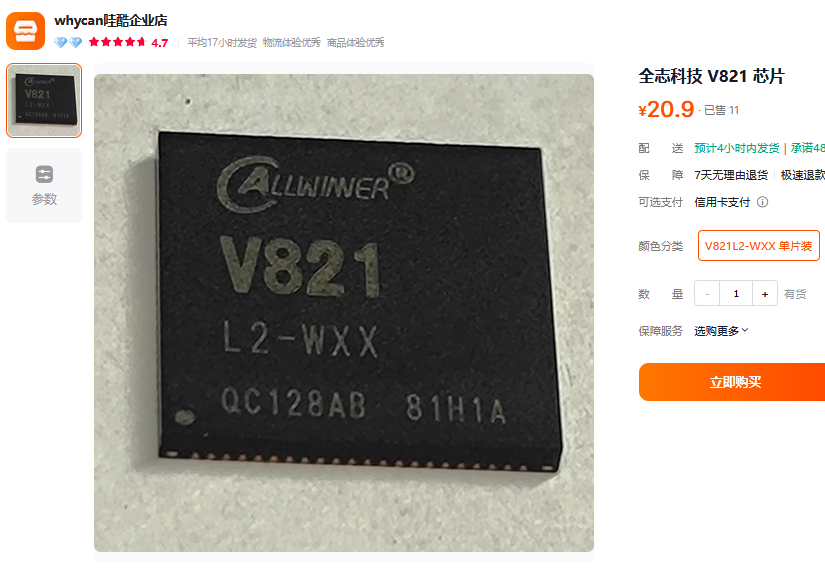
Let’s take a look at the detailed specifications.
The V821 is a dual RISC-V architecture SoC, with an integrated high-performance ISP and hardware encoding unit that supports 4MP camera input, ISP processing, and H.264 encoding. The V821 supports single, dual, and triple camera input solutions, and also integrates modules such as Wi-Fi, LDO, IRCUT Driver, and Audio Codec. With excellent ISP processing capabilities, low power consumption, and high expandability, the V821 can be extended to multi-lens network cameras, low-power doorbells, smart locks, and other products.
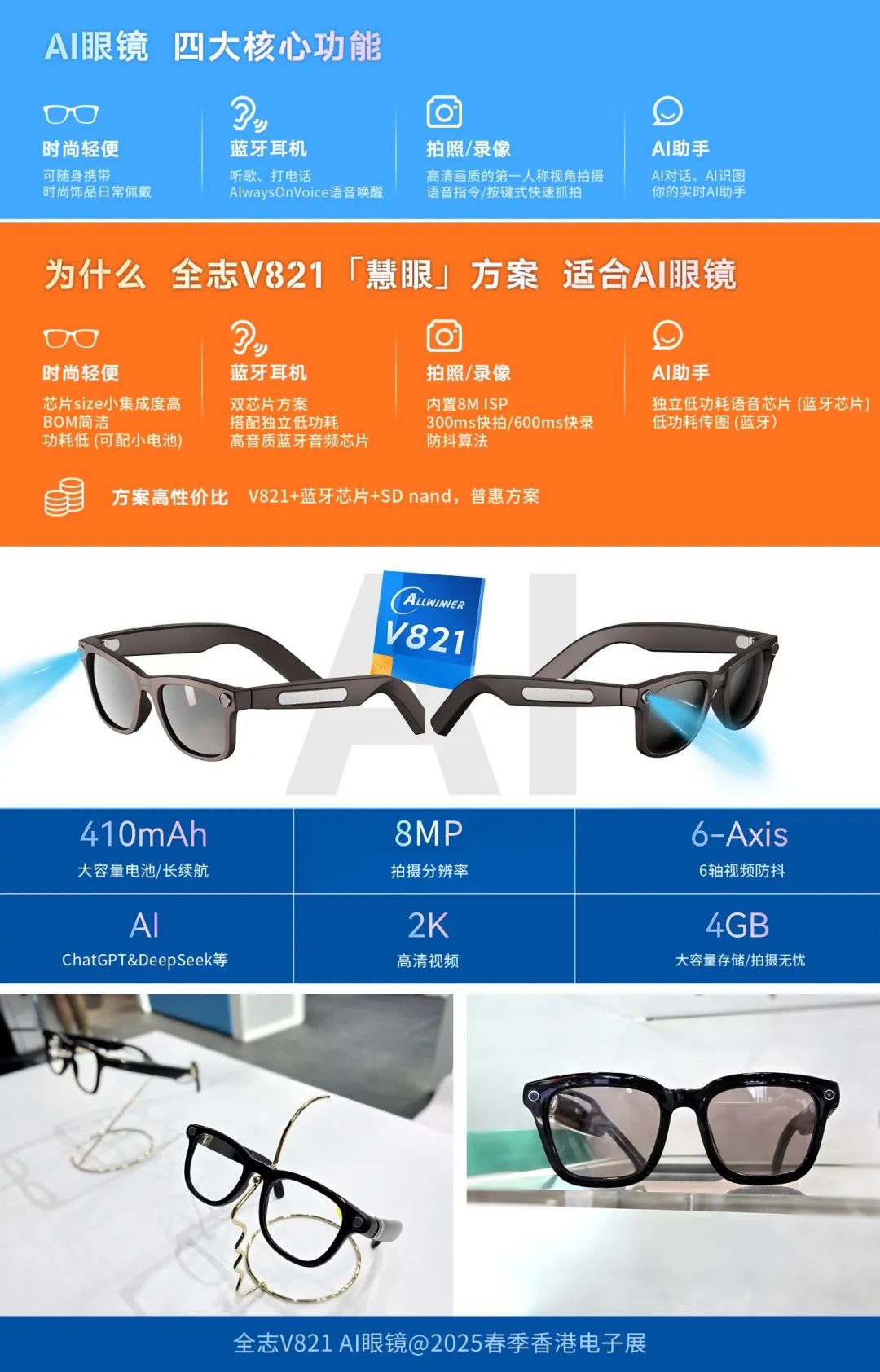 Advantages of the Allwinner V821 Architecture
Advantages of the Allwinner V821 Architecture
The Allwinner V821, with its high integration and miniaturization characteristics, provides customers with flexible and efficient solutions:
- Leveraging the mature industrial chain advantages of Bluetooth chips, the V821 flexibly adapts to various Bluetooth headset solutions, offering more choices in Bluetooth configurations, and can seamlessly expand display functions based on wearable Bluetooth chips;
- During high-definition image/video transmission, the V821’s high-speed bus can directly send HD video and images to mobile phones via built-in Wi-Fi, further saving power to extend battery life;
-
The V821 has built-in low-power memory, allowing for the selection of more cost-effective storage options such as SD NAND, in addition to traditional solutions, further reducing overall costs.
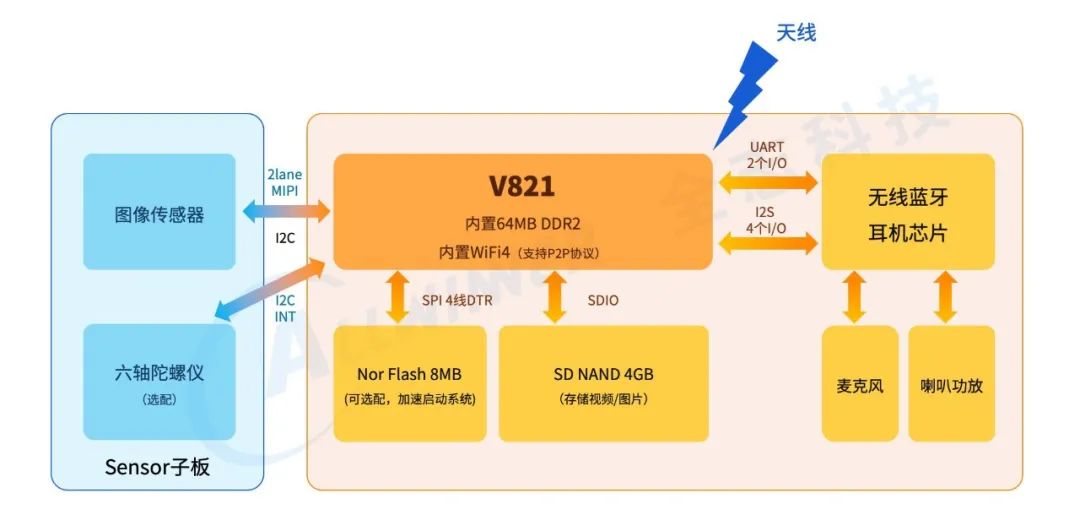
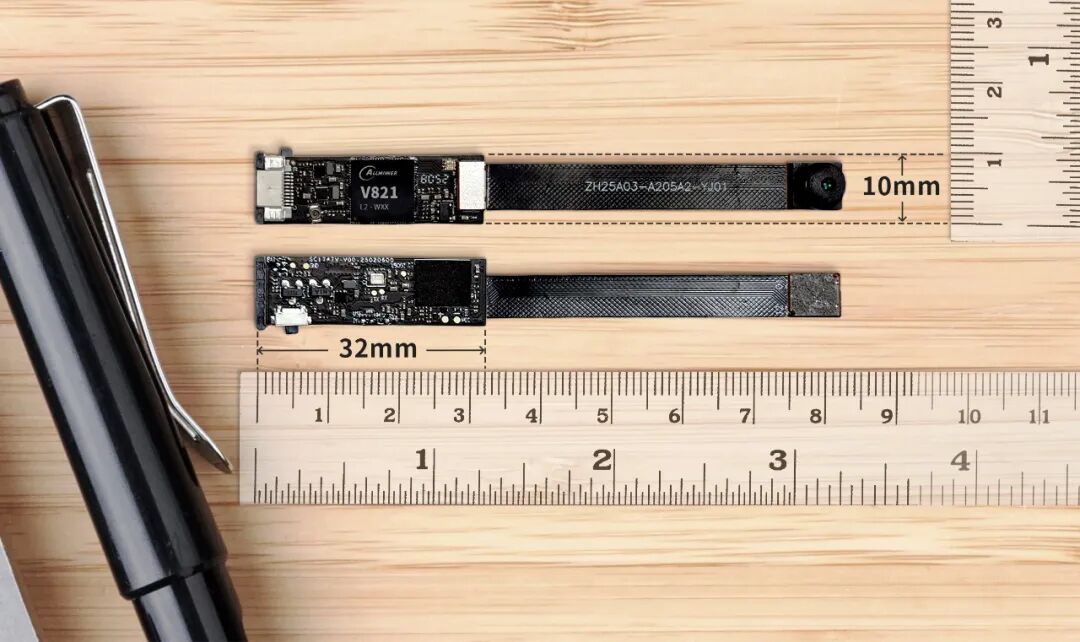 Based on the performance advantages and specifications of the V821 chip, Allwinner has integrated years of experience in action camera image processing into a product package that meets the architecture of AI glasses, including chip-level, solution-level, and resource-level support, facilitating the rapid deployment of visual wearable products including AI glasses.
Based on the performance advantages and specifications of the V821 chip, Allwinner has integrated years of experience in action camera image processing into a product package that meets the architecture of AI glasses, including chip-level, solution-level, and resource-level support, facilitating the rapid deployment of visual wearable products including AI glasses.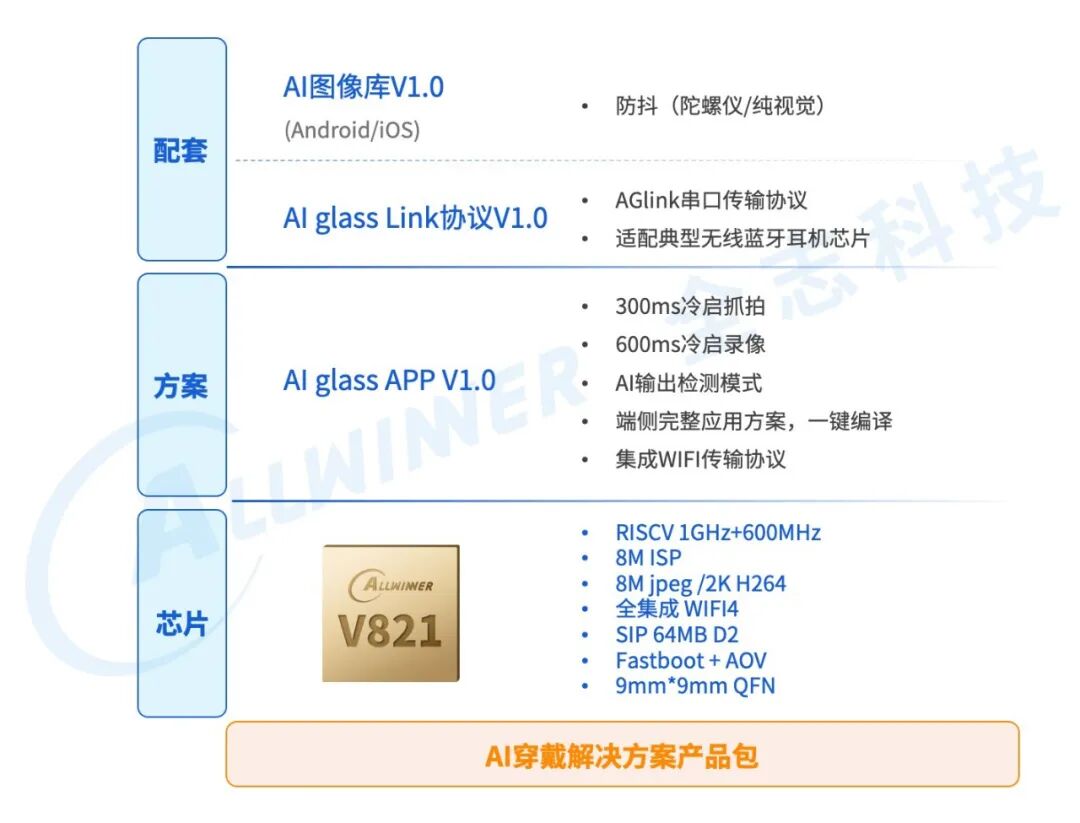 Chip Level
Chip Level
Big and small core collaboration, millisecond cold start
Fastest 300ms to enter photo mode, 600ms to enter recording mode, meeting the quick capture needs of AI glasses.
Low memory, high pixel, video frame fusionprocessing
Can achieve typical 5MP to 8MP image sensor input and photography under 64MB memory,1080P to 2K video recording, and supports low-latency gyroscope packaging for stereo frame synchronization, facilitating mobile-side fusion processing.
Low power consumption, long battery life
In typical 1080P 30fps video shooting scenarios, the chip’s average power consumption is 283 to 295 mW.
Customized ISP, more suitable for AI glasses
For the small image sensors and small apertures typically used in glasses, professional-grade ISP optimizations are applied.
The following images show the outdoor shooting effects of the V821 paired with the corresponding sensor module:


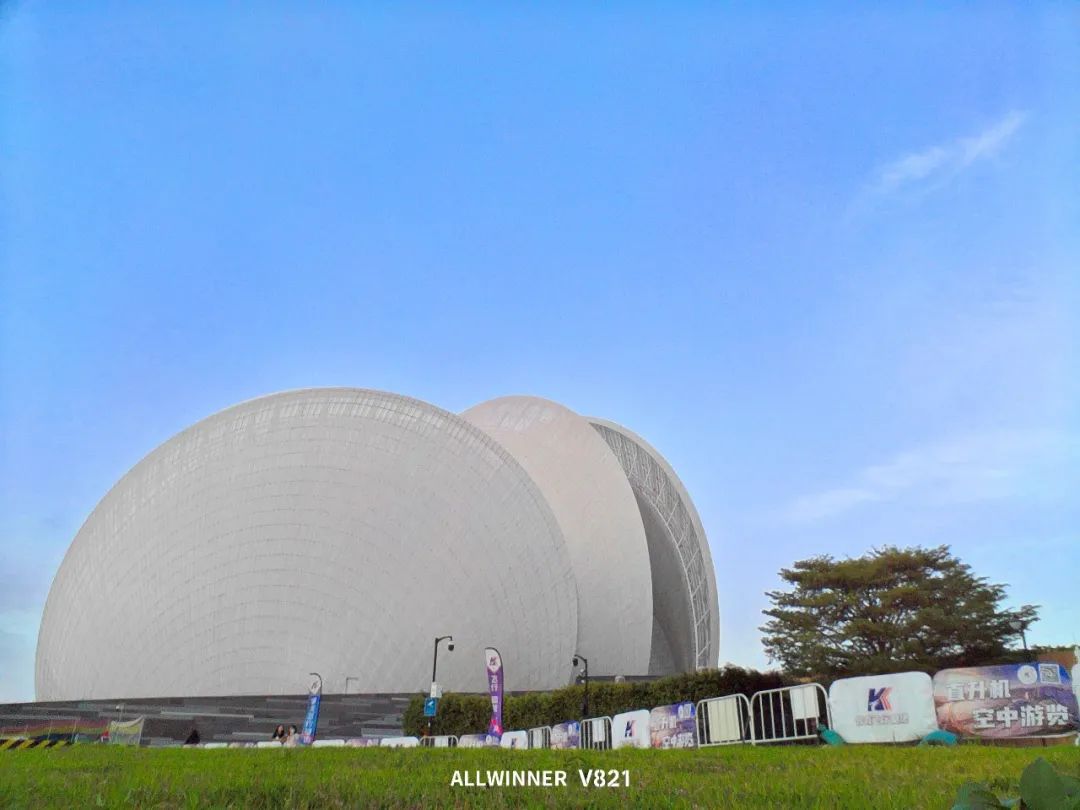

Swipe left and right to view
Outdoor shooting effects of the V821
Solution Level
Hardware Reference
For typical AI glasses hardware requirements, Allwinner provides a complete V821 hardware verification reference design and prototype development evaluation board, with reserved interfaces for freely combining backend Bluetooth chips for rapid prototype development and debugging.
Software Applications
For nine typical business scenarios including photography, video recording, photo and audio/video file storage, file transmission, and AI image recognition, typical scenario firmware can be compiled with one click, enabling rapid integration with Bluetooth chips. Complete Linux application source code will also be provided for secondary development, facilitating the expansion of various differentiated visual wearable products.
Protocol Support
For efficient debugging needs between SoC and Bluetooth chips, a complete communication protocol has been implemented based on UART/I2S and other interfaces, and RTOS source code is provided for customers to port on the Bluetooth chip side, balancing real-time performance and flexible expansion.Resource LayerCore Peripheral Components
For commonly used materials in AI glasses products such as cameras and storage, adaptations have been completed, including: Geke Micro 5MP image sensor, Sony 8MP image sensor, Hengshuo, and Xintianxia storage devices. More models are continuously being adapted based on demand.
Algorithm Support Layer
Allwinner not only provides a processing library for basic smartphone anti-shake algorithms but can also assist in integrating third-party anti-shake algorithm libraries, facilitating partners to quickly integrate anti-shake effects based on existing smartphone apps. More image and video processing enhancement features will be upgraded in the future.
It is reported that Allwinner’s next-generation V881 series chips, supporting 12MP to 20MP photography and 4K video recording, will debut in the second half of 2025; the V881 chip solution can also seamlessly upgrade on the V821 wearable solution.
